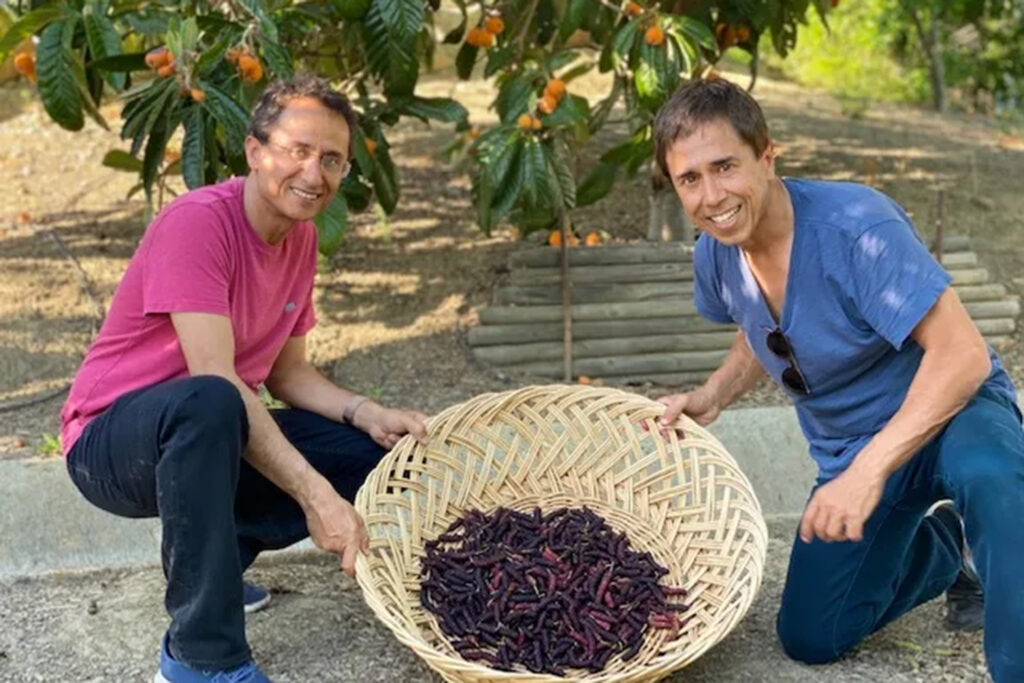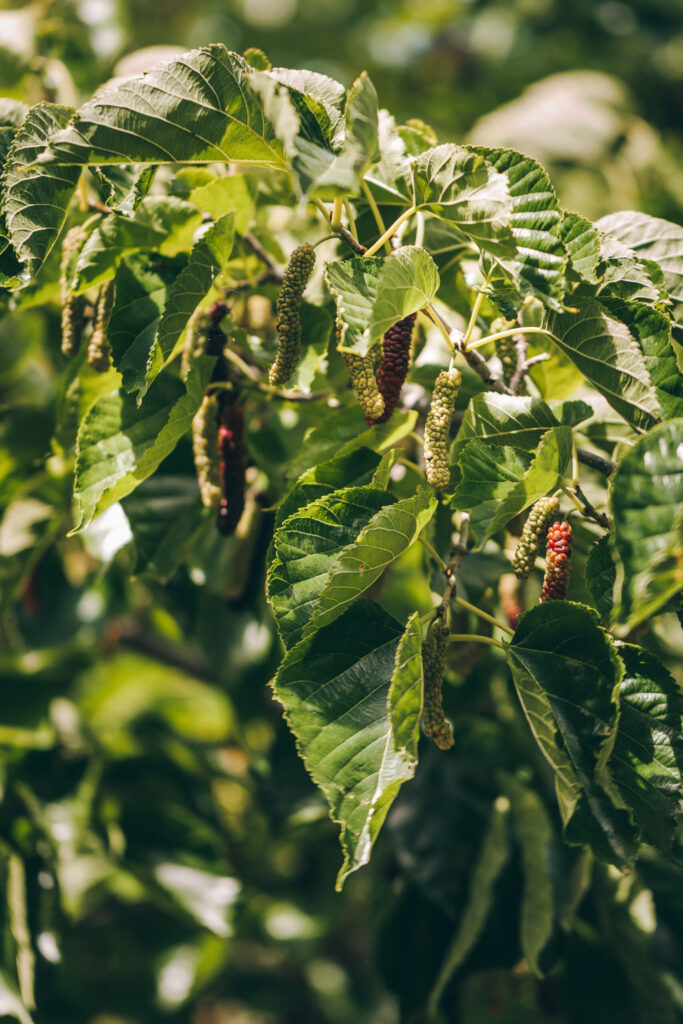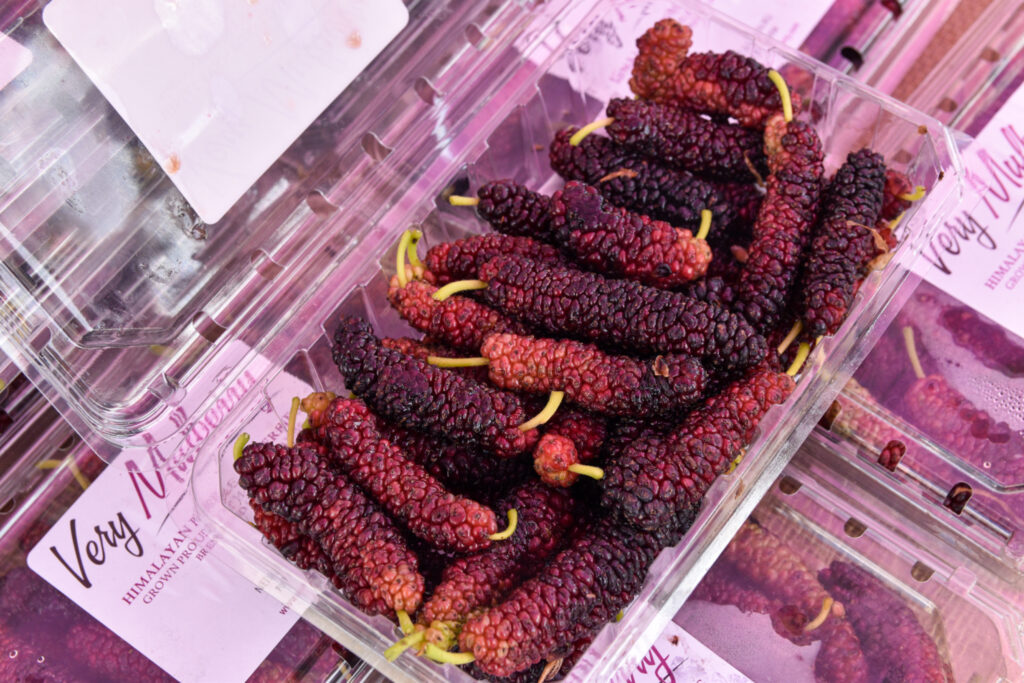Very Mulberry Aims to Introduce America to a Rare and Regal Fruit
Selina Knowles, Communications Coordinator
May 19, 2023

“I’ve been interested in fruits, vegetables, and the outdoors since I was a kid,” says Anil Godhwani, who grew up visiting the outdoor Subzi Mandi (vegetable market) in Delhi, India, with his dad. Since immigrating to the United States 30 years ago, he’s always found his way to farmers markets, but noticed a few things were missing. “A lot of the fruits and vegetables that I grew up eating we weren’t able to access here, mulberries being one of them.”
Taking matters into his own hands, he planted a few trees in his backyard about 15 years ago and shared the fruits with friends and family. After noticing how mulberries ignited a nostalgic fondness for so many people, he was motivated to grow them on a larger scale. He teamed up with his brother, Gautam, and friend, Smita Sadana, recalling that “the three of us decided that it would be awesome to introduce America to mulberries.” Together they started Habitera Farms in Brentwood and created the brand Very Mulberry to grow and share these sustainably harvested delicacies.

From U-Picking to Planting Trees in Brentwood
Anil’s love of the outdoors brought him to Brentwood numerous times over the past 15 years to enjoy the area’s abundant U-pick opportunities. He cherishes memories of renting a large bus, packing it with close friends and family, and heading out for a day of picking apricots, cherries, and nectarines.
When Anil was ready to grow mulberries beyond his backyard, Brentwood was the natural choice. “I was already familiar with Brentwood and the farming community there,” he says. “One of the farmers I knew mentioned, ‘Hey, there’s some land that’s come up that has pretty good soil.’ That was the trigger I needed to buy the land in 2018.”
It takes about three or four years before the mulberry tree produces a substantive yield. So, after planting in 2018, this is the first year that Habitera Farms is able to harvest enough to bring to farmers markets and open for U-pick visitors.
On 90 acres (6 leased from a neighbor), Habitera Farms now hosts what may be the largest mulberry U-pick in the United States. On weekends during harvest season, typically mid-April to late June, Anil and the team welcome visitors to pick from their thousands of mulberry trees.
For Anil, bringing people together to spend time outside and appreciate the fruit of his childhood is a true delight. “It’s so wonderful that just this first weekend we were able to host over a thousand people from all these different parts of the Bay Area, and originally from all over the world,” he says.

The Flavorful, Fragile Fruit That’s Hard to Find
Mulberries are native to Asia and North America, with over 100 different varieties growing in the United States, ranging from whitish to deep purple, and tiny to a few inches long. They’re also packed with essential nutrients, including calcium, iron, potassium, and vitamin C.
Habitera Farms grows the purple Pakistan mulberry. Native to South Asia, this variety is often called “shahtoot” meaning “king’s mulberry.” Anil says that it “had that X factor in the taste and the texture. It was basically the best tasting mulberry that we could find.”
Due to their brief harvesting season, intensive labor needs, and short and fragile shelf life, mulberries are a rare treat that are not typically grown commercially. After pivoting from a career in software technology, Anil was up for the challenge of innovating ways to bring mulberries to the Bay Area in a bigger way than ever before.
“We’re trailblazing here,” he says. “We’re doing a lot of R&D (research and development) on shaking and picking.” Picking mulberries by hand isn’t out of the question at Habitera Farms, but they’ve been experimenting with a shaking and catching method.
“Mulberry picking is like treasure hunting,” Smita says. She explains that it can take some searching to find the mulberries that are the most ripe. By shaking the trees gently, the mulberries that are ripe fall off the branches and onto a net that’s waiting to catch them below.
After harvesting, mulberries’ shelf life is at most a week, and their delicateness makes them difficult to transport long distances. “You pretty much have to grow them locally and supply it in that region,” says Anil, which is why Very Mulberry is available only at farmers markets and to farm visitors.
“When you actually see mulberry and you taste it, those challenges do seem worthwhile,” says Smita. “Some berries are acquired tastes, some berries are easier to like, but I found that mulberry is the easiest to love.”

The Newest Farmers at the Farmers Market
While Very Mulberry may be new at the Ferry Plaza Farmers Market, regular Saturday shoppers may recognize a familiar face at their stand along the south driveway. Joyce Zhang, has been coming to the Ferry Plaza Farmers Market for over a decade, working at Eatwell Farm nearly every Saturday, and lending a hand at other farms more recently.
“When I joined Habitera in September, I did R&D work on the orchard, such as performing sample tests, tree mapping, leaf tissue collection for analysis, planting cover crops, pruning experiments, and initiating our transition to organic certification,” says Joyce, who has a background in biology. “Now that we’re fully in the 8 to 10 week harvest season, my efforts have moved into representing Habitera at a number of farmers markets, while also exploring outlets for value-added products such as mulberry shrub, vinegar, and jam.”
Very Mulberry started at the Ferry Plaza Farmers Market last weekend, a few weeks later than they expected due to weather delays. Unpredictability is something that Anil is still getting used to, as a new farmer.
“Farming is a very unpredictable business because there are so many factors, the weather, the water, just so many things that are not in your control,” says Anil. “Coming from the software and technology business, these things were lessons for me.”
Throughout the learning curve, Anil’s been grateful to have connections in the Brentwood community. He has appreciated guidance from neighboring farms, like Frog Hollow Farm, which also grows organic Pakistan mulberries, as well as Habitera Farms’ experienced general manager, Luis Delagarza.
If you have never tried mulberries, Anil and Smita are enthusiastic that you are in for a treat. Anil says “It’s a very different and distinct flavor compared to just about any other fruit or berry. So, you pretty much have to taste it.”
Support Very Mulberry at the Ferry Plaza Farmers Market on Saturdays and at Mission Community Market on Thursdays.
Topics: Farmers, Farms, Fruit, New farmers
